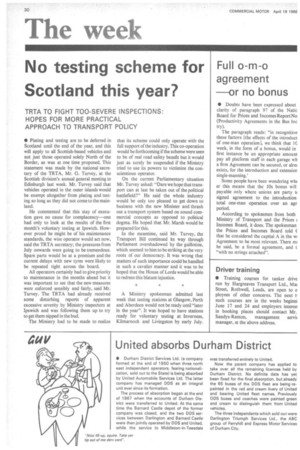The week
Page 32

If you've noticed an error in this article please click here to report it so we can fix it.
No testing scheme for Scotland this year?
TRTA TO FIGHT TOO-SEVERE INSPECTIONS: HOPES FOR MORE PRACTICAL APPROACH TO TRANSPORT POLICY
• Plating and testing are to be deferred in Scotland until the end of the year, and this will apply to all Scottish-based vehicles and not just those operated solely North of the Border, as was at one time proposed. This statement was made by the national secretary of the TRTA, Mr. G. Turvey, at the Scottish division's annual general meeting in Edinburgh last week. Mr. Turvey said that vehicles operated in the outer islands would be exempt altogether from plating and testing so long as they did not come to the mainland.
He commented that this stay of execution gave no cause for complacency—one had only to look at the results of the first month's voluntary testing at Ipswich. However proud he might be of his maintenance standards, the wise operator would act now, said the TRTA secretary; the pressures from July onwards were going to be tremendous. Spare parts would be at a premium and the current delays with new tyres were likely to be repeated right across the board.
All operators certainly had to give priority to maintenance in the months ahead but it was important to see that the new measures were enforced sensibly and fairly, said Mr. Turvey. The TRTA had already received some disturbing reports of apparent excessive severity by Ministry inspectors at Ipswich and was following them up to try to get them nipped in the bud.
The Ministry had to be made to realize that its scheme could only operate with the full support of the industry. This co-operation would be forthcoming if the scheme were seen to be of real road safety benefit but it would just as surely be suspended if the Ministry tried to use its powers to victimize the conscientious operator.
On the current Parliamentary situation Mr. Turvey asked: "Dare we hope that transport can at last be taken out of the political battlefield?" He said the whole industry would be only too pleased to get down to business with the new Minister and thrash Out a transport system based on sound commercial concepts as opposed to political dogma. He hoped that Mr. Marsh would be prepared for this.
In the meantime, said Mr. Turvey, the Transport Bill continued its way through Parliament overshadowed by the guillotine, which seemed to him to be striking at the very roots of our democracy. It was wrong that matters of such importance could be handled in such a cavalier manner and it was to be hoped that the House of Lords would be able to redress this blatant injustice.
A Ministry spokesman admitted last week that testing stations at Glasgow, Perth and Aberdeen would not be ready until "later in the year". It was hoped to have stations ready for voluntary testing at Inverness, Kilmarnock and Livingston by early July.








































































































































